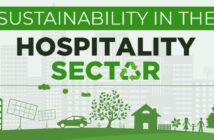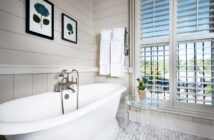Help the environment, improve the guest experience, and save some money in the process
“Sustainability is not about gumshoe liberals hugging trees,” insisted Beth Heider. “A prosperous business is our objective and sustainability is a path to getting there” noted the former Chairperson of the Board for U.S. Green Building Council. Heider believes there is plenty of “green” to be made while going green, but it’s also clear that the importance of enterprises making sound decisions to protect our threatened environment is among her top priorities.
But, Heider added, sustainability isn’t the only movement afoot in 2022. The COVID-19 pandemic has ushered in a new era of heightened awareness about personal health and well-being that isn’t likely to disappear even if the coronavirus does. Consumers want greater assurances that the air they breathe, the water they drink, and the food they eat is pure and fresh. When it comes to choosing between establishments, cleanliness is most certainly closest to godliness for today’s guest.
These two themes, sustainability and healthy living, roll into one interconnected jumble that links fear of environmental demise with worry about staying well in an uncertain world. A looming potential ecological catastrophe together with the COVID-19 fury fuels the perfect storm. The hospitality industry must respond to the demands of an evolved consumer who wants a safe place to sleep tonight but also demands promises for a brighter, or at least less fatalistic, tomorrow.
BUSINESSES’ SUSTAINABILITY IMPERATIVE
Heider, now a sustainability consultant based in Alexandria, VA, feels the message is getting out. “Finally, sustainability has connected with business. You win, your brand wins, the world wins.”
The hospitality industry is a good place to look for examples of sustainability in action. Hotel operators see great potential to do good things for the planet while pleasing their guests and, in many cases, making strides to improve their own bottom line. The big players already have made big, very public moves to go green. Marriott International posts its sustainability goals for 2025 on its site. Promising a reduction in their environmental footprint and an increase in responsible sourcing. Hilton vows to cut its environmental footprint in half by 2030.
Sure, it’s important that hotels, and all businesses, take environmental issues more seriously for our own preservation as humans. Beyond our sense of responsibility to the next generations, however, is also a need to project the right image for our establishments. Public perception on eco-friendliness is becoming an increasingly more important factor in hotel selection. According to Heider, “Younger consumers are walking the talk. They are choosing brands that reflect their belief systems.”
If your website doesn’t boast enough green accomplishments, would-be guests might instead check into an establishment that better reflects a sincere understanding of sustainability.
CLEAN LIVING
While these same consumers are scrutinizing your property’s carbon footprint, they also may be pondering whether your establishment offers them a sufficiently healthy experience. The pandemic has shone a bright light on details some of us have overlooked. Fear of getting on planes or trains, or being packed into a tight restaurant, because the air we breathe in those places could get us sick is a new worry many are taking more seriously.
While not all consumers are obsessing over clean air or water when choosing a hotel, they may find it welcoming to learn the place they’ve selected is looking after their health and well-being. Communicating to your potential guests that your hotel is not a sick building but in fact a healthy environment, can be welcoming news that seals the deal to securing a booking.
HEALTHIER STAYS
According to Heider, transforming a property into an environmentally forward, healthy enterprise doesn’t need to be completed overnight nor does it require millions of dollars to get started. A good place to start your green ambition would be the U.S. Green Building Council, whose motto is “Healthy people in healthy places equals a healthy economy.” On their website, www.usgbc.org, you can learn how to transform your building and what steps to take to reach the coveted status of being LEED certified.
For sustainability newcomers, Heider suggests looking at initiatives that impact a hotel’s water and air systems for more affordable, easier fixes. Taking proactive steps in these areas can help reduce your property’s carbon footprint, create a healthier environment for your guests, and help you save money in unexpected ways.





